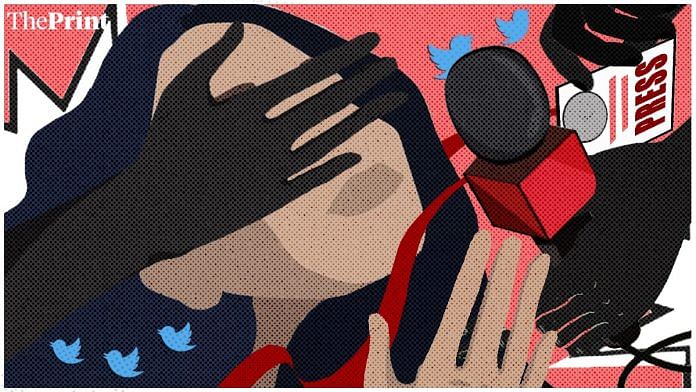New Delhi: Last week’s arrest of Republic TV Editor-in-Chief Arnab Goswami in an alleged abetment to suicide case has raised several debates over the violation of the freedom of press and the role of political vendettas in the scheme of things.
We asked readers: Is India’s media freedom under threat?
Here is what some of them said:
‘In last 5-6 years, media forced to be silent on issues that matter’
Indian media was never completely ‘free’ but in the last five-six years, it has been forced to be silent on the issues that matter the most. Many media houses have toed the government line, but there were and are still few journalists and media houses who dare ask relevant questions of the government. Sadly, this ‘dare’ comes at the cost of their lives and career. Gauri Lankesh and Shujat Bukhari were of this clan of fearless journalists. Sr. Managing Editor (NDTV) Ravish Kumar has rightly said, “Scared reporters gives birth to dead citizens in a democracy.”
 Akshay Sonawane, Nashik.
Akshay Sonawane, Nashik.
‘Arnab Goswami’s arrest raises questions of press freedom’
Yes, the media is under constant scrutiny, whether it is individual journalists or media houses. It has been under pressure from every governmental regime, but now the saturation point has come. Arnab Goswami may not be an idealist at an individual level, but his arrest raises questions of freedom of press even though it isn’t related to his journalism. Vendetta politics is being reflected in the form of a witch hunt and has once again raised the issue of police reforms. If it can happen with him, who has so much political and economic backing, it can happen with anyone. Journalism khatre mein hain (Journalism is in danger).
— S.P. Srikar Bhattar, Bengaluru. Twitter: @SPSrikarBhatta3
‘Journalists reporting govt failures are called anti-nationalists’
India’s free press has played a crucial role in protecting this country’s democracy since Independence. But journalists who report on wrong step/any failure/loophole in the government here now feel under attack. They are called as anti-nationalists by the ruling party and its supporters, they receive threats or pressure at some point of time, mostly through social media platforms. The reliability of media is going down because there are many news channels which show only the type of news that is pro-government. They only broadcast news which provide high TRPs, whether the news is true or not.
 Deepak Singh, Surat. Twitter: @deepaksingh7332
Deepak Singh, Surat. Twitter: @deepaksingh7332
‘Arnab Goswami being in jail has nothing to do with the media’
A subtle distinction has to be made between Goswami’s case and the overall issue of media freedom. Goswami being in jail has nothing to do with the media. Goswami, throughout a period of few months, called out the Maharashtra Chief Minister and his son repeatedly without any evidence. Uddhav Thackery didn’t assault the media. He assaulted Goswami. He just happened to be from the media. It was a personal battle. It should be treated as a case of Thackeray using his power to take revenge against his political opponents and not the media in itself. Of course, that is wrong too, but not the same. This is different from UP where journalists are getting jailed for reporting actual evidence-based issues in governance.
 Nivan Bagchi, Guwahati. Twitter: @nivan_bagchi
Nivan Bagchi, Guwahati. Twitter: @nivan_bagchi
‘Indian leaders need to be thick-skinned and let media be free’
Media’s freedom in India definitely faces many challenges and is secular to all parties in government. Whether its Mamata Banerjee in West Bengal or Yogi Adityanath in Uttar Pradesh who doesn’t like any adverse coverage. This problem has become more acute because of the increasing nexus between political parties and media channels and publications. The arrest of Arnab Goswami is a direct consequence of this. A similar situation can be seen in Andhra Pradesh, where Jagan (Chief Minister Jagan Mohan Reddy) owns his own news channel and publications, and some channels are considered spokesperson for (opposition leader) Chandrababu Naidu. They both banned the other when in power. Indian leaders need to be more thick-skinned and let the media be free; they should realise their actions otherwise are counterproductive.
— Vidyuth Chikoti, San Francisco. Twitter: @followvidyuth
‘It is evident that media freedom is under scanner’
When the most powerful and incumbent government tells the top court of the country of its desire to “regulate” the digital media because of its faster and wider viewership, then it is evident that media freedom is under scanner.
There can be no democracy without free media and free speech. Freedom of speech represented strongly by the freedom of media is vital for democracy to hold the politics and politicians accountable.
It is unfortunate that today Indian media is highly polarised. A section of mainstream media tends to be friendly, and at times even act as an attack dog for the people in power. We need more unhyphenated media (neither Left nor Right leaning) in the polarised world today. At the same time, media should do more fact checking. Never before has the need for fact checking been greater than today. Media’s role should remain as the watchdog of democracy instead of attack dog for the people in power.
 Sivanesh R, Erode district, Tamil Nadu.
Sivanesh R, Erode district, Tamil Nadu.
‘Media has been under threat for a while now’
Media is not under threat today; it has been for a while now. Using media to propagate agendas and silencing those who disclose the truth has become a norm. Media is supposed to a careful observer and messenger to the people. Therefore, any restriction of the media would be counterproductive to a democratic society. Indian media is dealing with a country that stands divided and selective outrage from those in power. India’s biggest threat is from itself when it diverges from the path of journalistic integrity and a neutral standing, to choosing sides in a polarised society such as ours.
— Aulina Pandey, Delhi.
‘Many media houses have been ideologically hijacked’
Media is considered as the fourth pillar of democracy. It is the medium where people express and exchange their ideas. But India has seen a ban on articles and books, arrests of cartoonists-journalists under draconian acts, and murders of journalists and political activists. These are overt actions taken to curb the freedom of media. But there has long been a covert effort as well, which is easy to miss.
Many media houses are ideologically hijacked, and single-directional thought process is propagated. It rejects the presence of diversity of thought, and influences and exploits the emotions of people to further their interests. This depreciated condition of Indian media has not gone unrecognised. The non-profit organisation ‘Reporters without Borders’ has ranked India 142 of 180 countries in the global press freedom index. Since 2010, the rank is continuously declining. This emphasises the need of urgent attention towards freedom of press and expression.
 Shruti Wankhade, Paratwada, Amravati. Twitter: @Shruti84471040
Shruti Wankhade, Paratwada, Amravati. Twitter: @Shruti84471040
‘There is decreased trust in media’
Indian media is going through one of its most difficult phases since Independence. Like everywhere, the media always remains under some form of pressure from the ones in power and this is also not a new phenomenon, as witnessed during successive governments. But presently in India, the ‘Institution of Media’ itself is facing a question mark, which is unprecedented. It is happening, as some would argue, due to excessive pressure from government and other external threats. But this time, media is further weakened due to internal factors, such as disregarding professional ethics, brazen claims, baseless arguments, promotion of inauthentic news etc., just to gather more views and in turn earn more revenue. All this has decreased trust in the media and hence its freedom is under severe pressure.
This has made some to even speculate the death of Indian journalism. But as the saying goes, ‘night is darkest just before the dawn’, we hope Indian media will witness a golden dawn with growing media business models like The Print, The Wire, Newslaundry etc., where subscribers pay to get authentic and good journalism and media also has prime goal of serving public rather than advertisers.
 Shirish Patil, Sangli, Maharashtra. Twitter: @darjedar1
Shirish Patil, Sangli, Maharashtra. Twitter: @darjedar1
‘Media under threat because there is no ethical accountability’
Good intentions are always bad for the people who have different perspectives. This media threat is not a new subject; we have experienced it since colonial rule. Media faced its major challenge during Indira Gandhi’s Emergency period when freedom of press was cut for 21 months. The real intention of press or media is to deliver the truth and their opinion to the public in order to create awareness. If our opinion creates conflict for the other party or person, then the real difference occurs.
Earlier, media meant only newspapers, channels or magazines. But now, there are other alternatives such as social media. The person who runs any type of media should have minimum ethical values. They should not be corrupt and biased. India’s media at present is definitely under threat because this ethical accountability is no more there. The main culprits are within the media family not from the outside. The degradation of accountability is happening because of the consequences faced by some journalists or by the public, if the content is opposite to one political party or person. People are put behind bars under UAPA Act by blaming them for provoking radical ideologies in public. This is totally unfair. So many intellectuals like us are not giving our opinions because of fear. If our opinions are curbed by implementing legislative laws, it shows that freedom of expression is definitely under threat.
 A. Rahul Sai, Kadapa. Twitter: @RAsanapuram
A. Rahul Sai, Kadapa. Twitter: @RAsanapuram
Also read: Reader View: Govt needs to encourage farmers to adopt other methods to tackle stubble burning


All these “selected” opinions on the media suggest that the Indian media is under siege. A totally untrue conclusion. The Indian Media is not a Holy Cow (No offense meant anywhere). The media has been systematically abdicating its duty of informing and concentrating on influencing. Even SG said so in one of his programmes – Media plays sides. Just like i this article (opinions)
So, please let the Indian Media NOT play the victim. The real victims are us Indians, starved of credible information. One treason also could be because we are not ready to pay for credible news.
For instance….why do the Media play games?
Take for instance, when you say “Modi Government” the focus stops at Modi and the the contents of the “reports” become inconsequential to the reader. If the heading is on the issue and ”Modi”, “Rahul”, “Captain” or “Mamata” are in small print the real message will get across better.
The media is now more free of FAKE NEWS N BRAINWASHING news editors.
As any moral high ground taken by journalist can indeed be quickly challenged in social media.
Earlier LIES were peddled by a media who had lifestyles matching the RICH AND FAMOUS.
Now as they are unable to conduct one sided conversation of their biased and paid VIEWS. Their job is become more challenging and they Have to report with no expectations of becoming rich quickly.
I THINK now we will have a media that if it is biased will be exposed and so I THINK NOW MEDIA IS FREE THAN EARLIER.